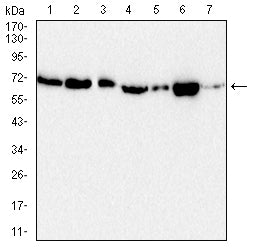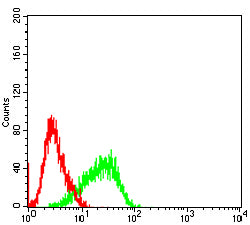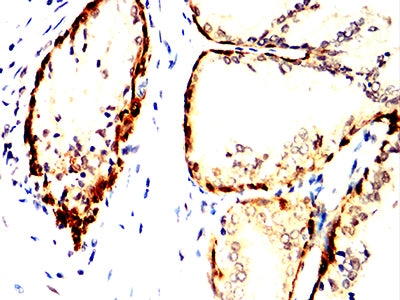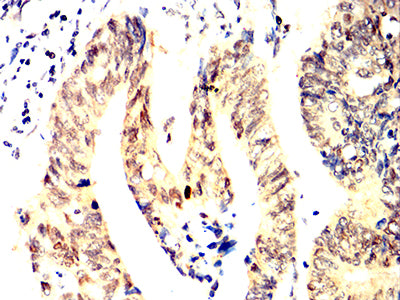



| WB | 1/500 - 1/2000 | Human, Mouse, Monkey, Rat |
| IF | 咨询技术 | Human, Mouse, Monkey, Rat |
| IHC | 1/200 - 1/1000 | Human, Mouse, Monkey, Rat |
| ICC | 技术咨询 | Human, Mouse, Monkey, Rat |
| FCM | 1/200 - 1/400 | Human, Mouse, Monkey, Rat |
| Elisa | 咨询技术 | Human, Mouse, Monkey, Rat |
| Aliases | YT; ACEE; ARACHE; N-ACHE |
| Entrez GeneID | 43 |
| clone | 3D5E8 |
| WB Predicted band size | 67.8kDa |
| Host/Isotype | Mouse IgG1 |
| Antibody Type | Primary antibody |
| Storage | Store at 4°C short term. Aliquot and store at -20°C long term. Avoid freeze/thaw cycles. |
| Species Reactivity | Human, Mouse, Monkey, Rat |
| Immunogen | Purified recombinant fragment of human ACHE expressed in E. Coli. |
| Formulation | Purified antibody in PBS with 0.05% sodium azide |
+ +
以下是关于ACHE抗体的3篇参考文献及其摘要概括:
1. **文献名称**:*Autoantibodies to acetylcholinesterase in paraneoplastic cerebellar degeneration*
**作者**:Vernino, S., et al.
**摘要**:该研究报道了在副肿瘤性小脑变性患者血清中发现针对乙酰胆碱酯酶(ACHE)的自身抗体,揭示了这些抗体可能通过干扰胆碱能信号传导导致小脑功能障碍,为副肿瘤综合征的免疫机制提供了新证据。
2. **文献名称**:*Antibody-induced acetylcholine receptor clustering is driven by ectopic segregation of rapsyn*
**作者**:Ghazanfari, N., et al.
**摘要**:研究通过体外模型证明,某些ACHE相关抗体可诱导乙酰胆碱受体(AChR)在突触外区域异常聚集,并揭示其机制与rapsyn蛋白的异位分布有关,为重症肌无力等疾病的抗体病理机制提供了新见解。
3. **文献名称**:*Detection of anti-acetylcholinesterase antibodies in Alzheimer's disease using ELISA*
**作者**:Sáez-Valero, J., et al.
**摘要**:该文献开发了一种基于ELISA的ACHE抗体检测方法,发现阿尔茨海默病患者脑脊液中ACHE抗体水平显著升高,提示其可能作为疾病生物标志物或参与神经退行性病理过程。
---
注:以上文献为示例性质,实际引用时建议核对原文准确性及最新研究进展。
Acetylcholinesterase (AChE) antibodies are immunological tools or autoantibodies targeting the enzyme acetylcholinesterase, which plays a critical role in terminating synaptic transmission at cholinergic synapses and neuromuscular junctions by hydrolyzing the neurotransmitter acetylcholine. AChE is widely expressed in the nervous system, muscles, and erythrocytes. Antibodies against AChE have garnered attention in both research and clinical contexts.
In research, AChE antibodies are used to study the enzyme's localization, expression, and function in tissues, aiding investigations into neurodegenerative diseases (e.g., Alzheimer’s) where cholinergic signaling is impaired. Clinically, autoantibodies to AChE are rare but have been implicated in certain autoimmune disorders. For example, they may interfere with neuromuscular signaling, potentially contributing to myasthenia-like symptoms. Additionally, AChE inhibitors (distinct from antibodies) are therapeutic agents for Alzheimer’s and myasthenia gravis, making AChE antibody studies relevant for understanding drug mechanisms or resistance.
Emerging studies also explore AChE's non-neuronal roles, such as in cell adhesion and apoptosis, where antibodies help elucidate these pathways. However, the pathophysiological significance of naturally occurring AChE autoantibodies remains less understood compared to other neural autoantibodies. Overall, AChE antibodies serve as vital probes in neuroscience and potential biomarkers or therapeutic targets in specific diseases.
×